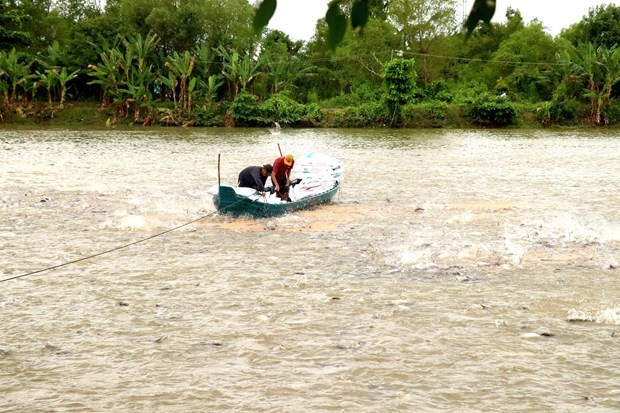
Workshop stresses PPP’s role in cutting emissions from tra fish production chain in Vietnam
Latest
 |
| Farmers feed tra fish in a Mejong Delta locality. (Photo: VNA) |
With about 6,000ha of the farming area and an output of over 1.5 million tonnes, tra fish is among the key fishery commodities of Vietnam. The country’s tra fish products have been exported to more than 140 markets in the world, bringing home about 2 billion USD in annual export value. Vietnam’s tra fish production and the related food safety and hygiene control system have also received positive assessment from the US Food Safety and Inspection Service.
However, there remain certain shortcomings and problems in the production, processing, environmental treatment, connectivity, and sale in the tra fish industry, heard the workshop held by the Directorate of Fisheries at the Ministry of Agriculture and Rural Development (MARD), the Sustainable Trade Initiative (IDH), and the Vietnam Pangasius Association.
Pham Thi Thu Hong, Vice Secretary General of the Vietnam Pangasius Association, cited research findings that show to produce an average of 200 tonnes of fish per ha, at least 320 tonnes of feed is needed and 256 tonnes of organic substances will be discharged into the environment. Besides, there are more than 100 tra fishing processing establishments nationwide with the designed capacity of 1.5 million tonnes of raw materials each year. Though equipment and technology for producing by-products such as fish oil and powder are relatively modern, they haven’t been able to make full use of fish blood, thus worsening the pollution of water used for processing.
That has resulted in an environmental challenge to tra fishing farming and processing, she said, holding that to secure sustainable development for the tra fish industry, it necessary to pay due attention to environmental protection, especially appropriate and highly practical solutions to waste from farming and processing.
Tran Dinh Luan, Director of the Directorate of Fisheries, considered PPP as a good approach to sustainably develop the tra fish chain under the circular economy model.
Given this, he noted, the MARD put forth the initiative of establishing a PPP group involving universities, research institutes, businesses, and domestic and foreign organisations to devise ideas for reducing emissions in each link of the tra fish chain.
In addition, PPP will help provide more information about the domestic and foreign markets in order to facilitate innovation, studies, and application to bring emissions down to the lowest possible level, thereby maintaining the reputation of Vietnam’s fishery products, including tra fish, in international markets, Luan added.
Hong said that following the global trend, the Vietnamese Government has committed to reducing emissions. Importers of Vietnamese fish also hope and pledge to cut carbon emissions by 20 - 30% during 2025 - 2030, so they want suppliers of fishery products to carry out emission reduction initiatives accordingly.
Therefore, fish farmers and processing businesses of Vietnam need to curb emissions during the production process to concurrently ensure product quality and keep emissions low, thereby promoting their competitiveness and maintaining reputation in the global market, she remarked.
























